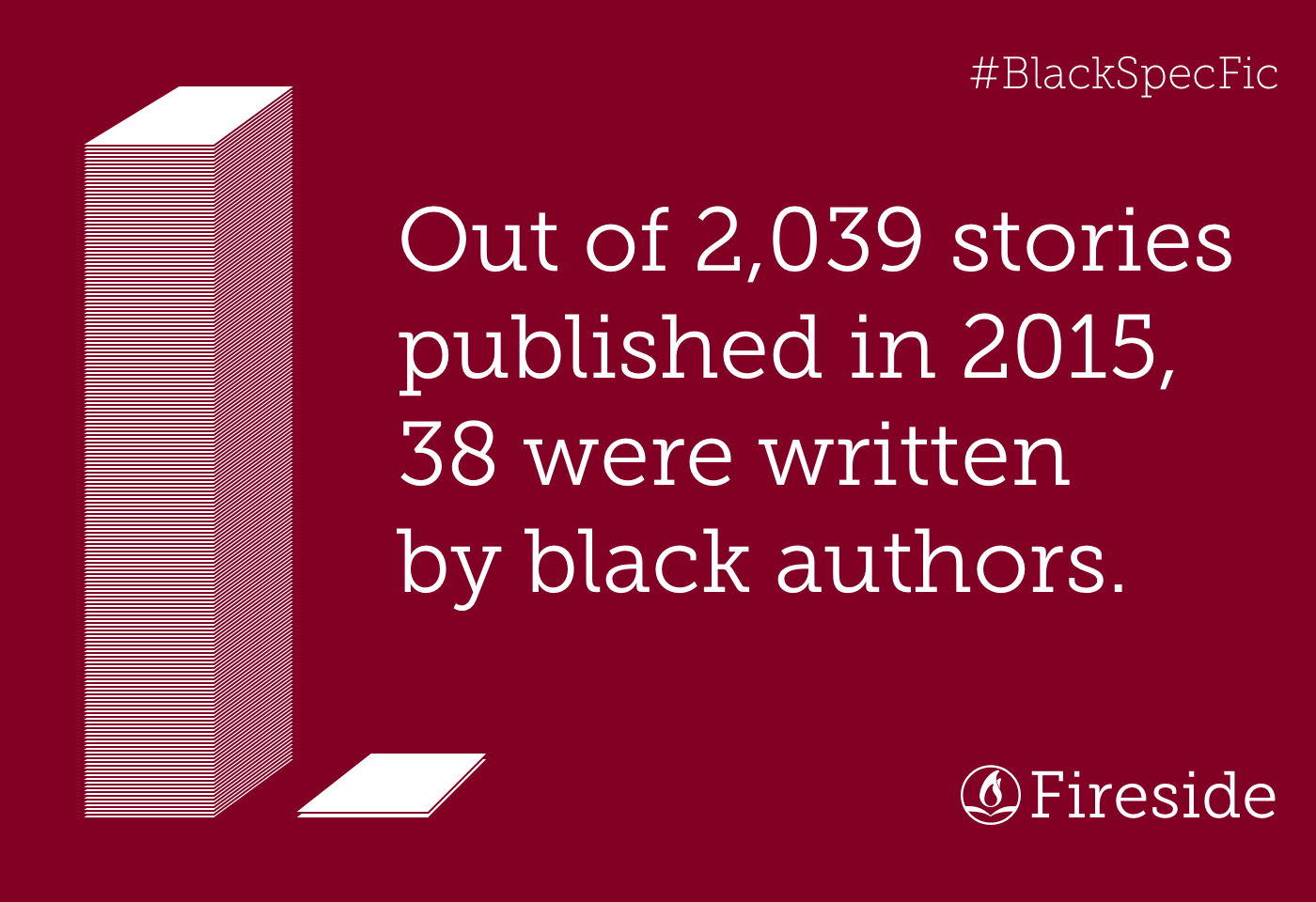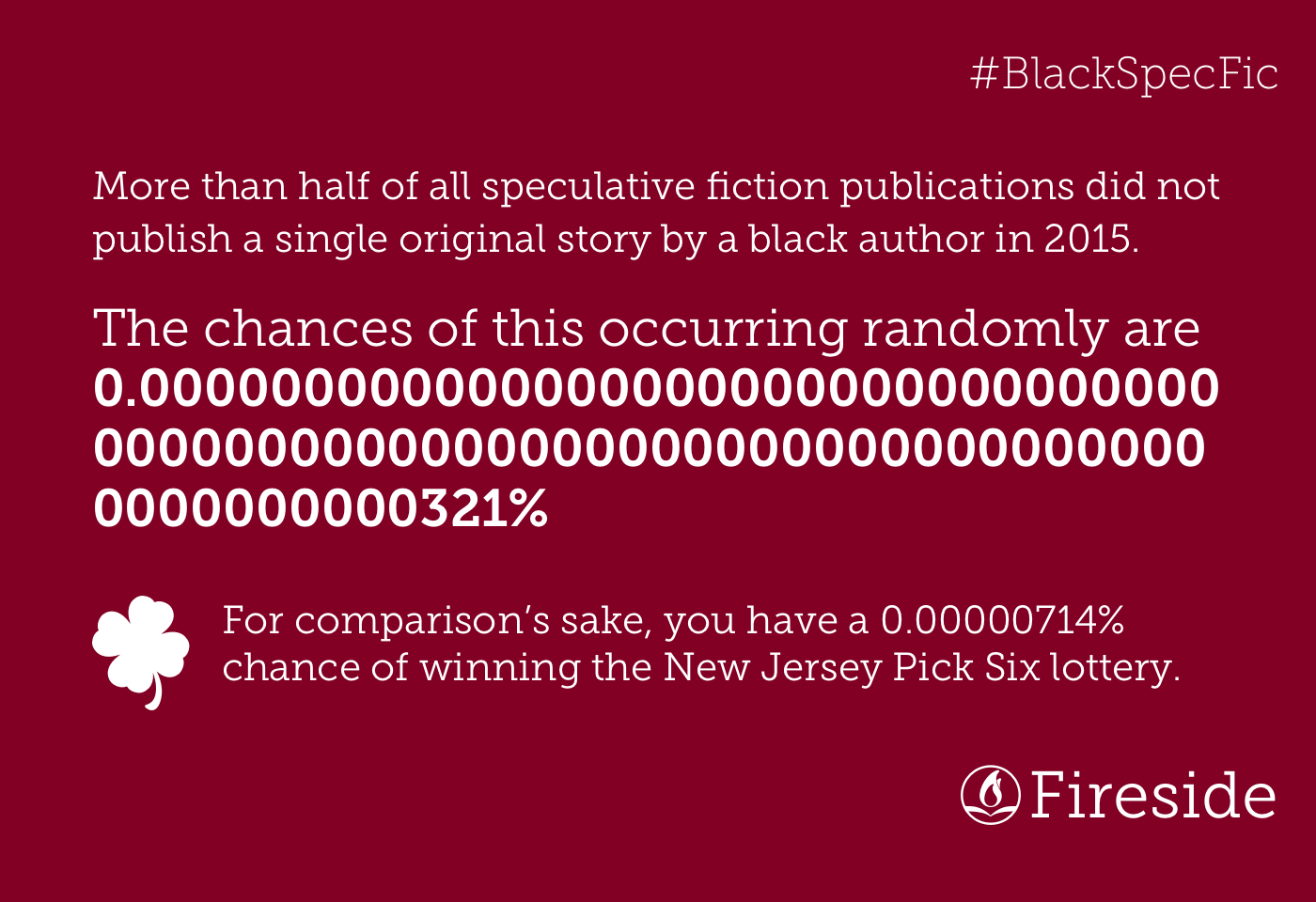Jul 26, 2016 | #Blackspecfic
A Note from the Editor of the #BlackSpecFic Responses
By Brian White
Fiction, we have a problem.
Racism.
Structural, institutional, personal, universal.
We all know this. We do. We don’t need numbers to see that, like everywhere in our society, marginalization of black people is still a huge problem in publishing. Specifically, as outlined here in Fireside’s special report, we see that marginalization in short fiction magazines and their online equivalents. These same problems persist across publishing, but our study is focused on the world Fireside lives and breathes in: the speculative short fiction market.
We don’t need the numbers to know that racism is a problem in our field. But we have them.
In 2015, of 2,039 stories published in 63 magazines, 38 were written by black writers. 38. That’s not even 2 percent.

Are you fucking kidding me?
Sadly, no.
These numbers are powerful. Because what they point to is this: this isn’t random. This isn’t some fluke, as Cecily Kane, Ethan Robinson, and Weston Allen, the report’s researchers, found.
The probability that it is random chance that only 1.96 percent of published writers are black in a country where 13.2 percent of the population is black is 0.000000000000000000000000000000000000000000000000000
00000000000000000000000000321%.

So what’s going on here? There are a lot of factors. Sure, as N.K. Jemisin says in our interview with her, some black writers opt out of the publishing system and self-publish, and have been doing so for years. But before you say, “A-HA! SEE THERE IS NO RACISM,” these writers do this because of the racism in the system. Why bother trying when you know you don’t have a chance?
Overt racism is only a small part of the problem, though. It’s the more subtle biases that really do us in. There’s the editor who “doesn’t get” a great story set in a black community. As N.K. says in her interview and as Tobias Buckell writes, there’s the casual dismissal of any conversation about racism by saying, “Well, here are four black authors I can name off the top of my head.” It’s always the same four authors, though. The names change, but the implications don’t. The advice to write “what the market wants” is code for white characters and white stories. The opportunities to network, like six-week writing workshops or weeklong conventions, are really only open to those with the means to miss work. The entire system is built to benefit whiteness, and to ignore that is to bury your head in the flaming garbage heap of history.
Our goal in publishing this report is not to call out individual magazines. It’s to call out the entire system. It may look easy for me to say that, because in 2015, 3 of Fireside’s 32 stories were written by black writers. That’s 9.4 percent! Near the top of the entire list of 63 magazines!
Guess what? In 2016, Fireside hasn’t published a single black writer. We have one or two in the pipeline for later in the year, but we’ve failed. We’re all failing. You can’t point to, as Nisi Shawl writes, the ones and twos and rarely threes representing the number of black writers in a magazine in the spreadsheet and pat yourself on the back. We’re certainly not.
So here’s what Fireside is going to do
-
We’re working with the developer of our submissions system to add in an optional, anonymous form for people to self-report their demographic information when they submit to Fireside. This way, we can take a much closer look at what is going on in our submissions pile.
-
We are going to change our submissions process. Once a year, we will still have one big submission period open to everyone. But several other times a year, we will have targeted submissions windows, each targeted toward a specific marginalized group. So black writers, writers of color generally, LGBTQA writers, women, writers with disabilities, etc. We’re still working out the details on this, but all the dates will be publicized well ahead of time, so that people who don’t have the leisure time to whip up a submission on short notice can get their work ready.
-
Fireside’s staff is currently one white man (me), one disabled white woman, and one Puerto Rican man. And that’s OK, but it’s not nearly good enough. As our staff expands, we will be looking specifically to add black people and others who represent marginalized communities. We will also look for more opportunities to work with guest editors from those communities.
-
We also want to hear from the black writing and publishing community about what else we could do better. You can email me directly at [email protected] or talk to us on Twitter.
There’s a lot more we can do. And I promise you, we’re going to kick our own asses every day to make sure we are always doing better.
A few notes to the manbaby angrily writing a comment on this post or on Twitter about #BlackSpecFic
-
If you’re about to scream at us about some variation of All Writers Matter, just sit the fuck down. We’re talking about antiblack racism here today. It’s a real, specific problem. Yes, there are a lot of other problems. Being white isn’t one of them. Just delete your comment or I’ll delete it for you. And don’t whine at me about free speech. This is my house. Go take a shit on your own rug.
-
Before you start yelling about “well, it’s just about quality,” go read the essays by Justina Ireland and Troy Wiggins. And the rest of the essays. Maybe you’ll learn something. That’s the whole point of this.
-
If you aim anything racist or otherwise bigoted at Fireside here or elsewhere, I will publicly name and shame you, and then block you.
-
If you aim any of that garbage at the writers involved in this report, I will not only name and shame you, I will fire you into the goddamn sun.
About the author
Help us keep this conversation going
We spend around $1,700 paying the various people involved in producing the #BlackSpecFic report and its accompanying essays every year. This type of work is a core part of our mission, and it is only possible due to your direct support.
You can make a one-time contribution directly to our #BlackSpecFic fund, or back us more broadly by becoming a Fireside subscriber. Either way, your cash will go toward helping us ensure a bright future for a thriving, sustainable, and inclusive field.